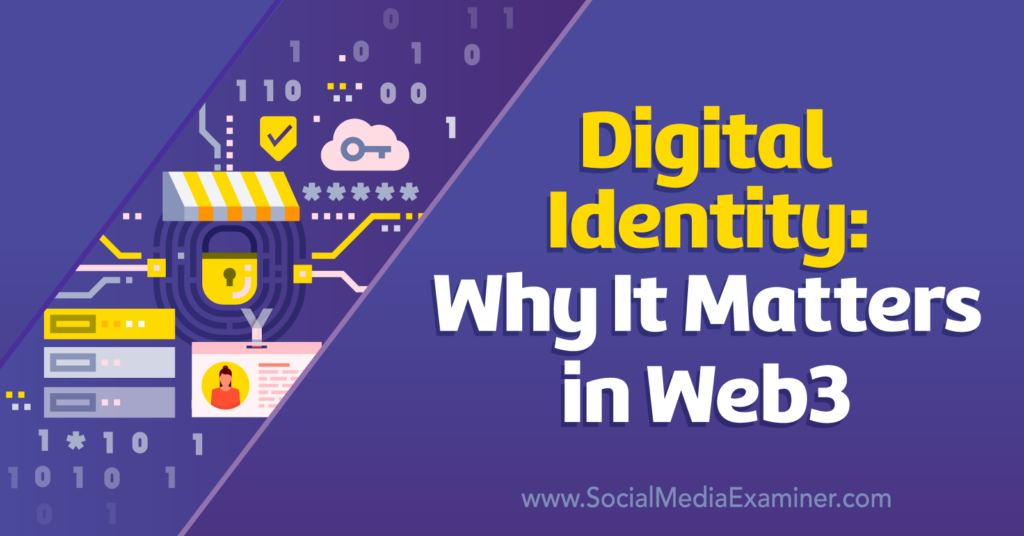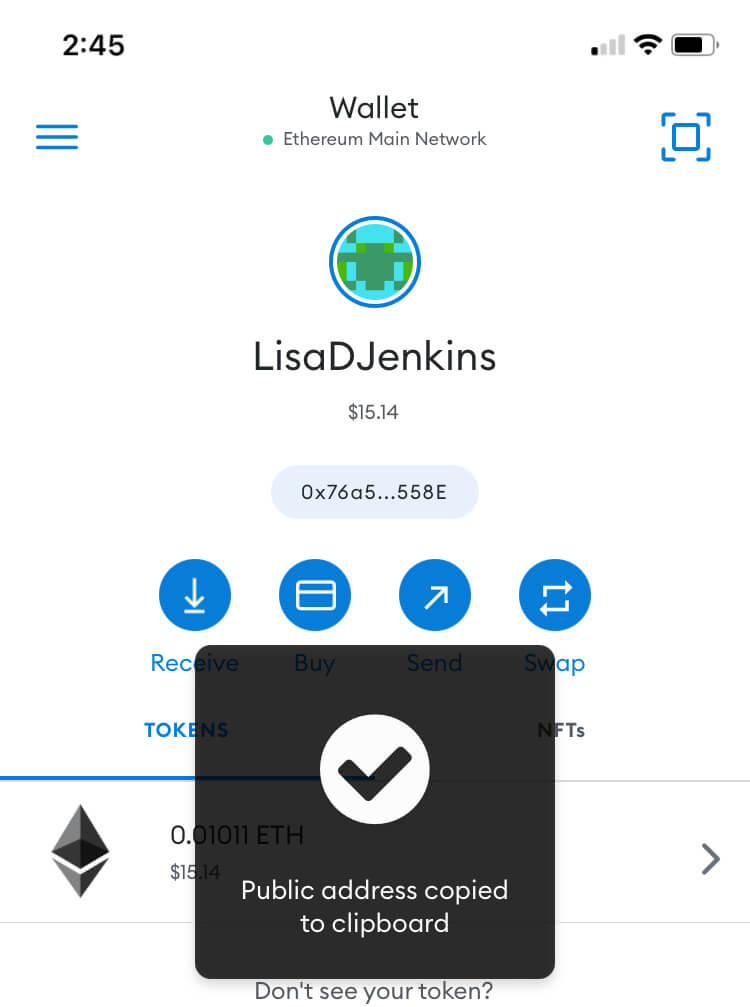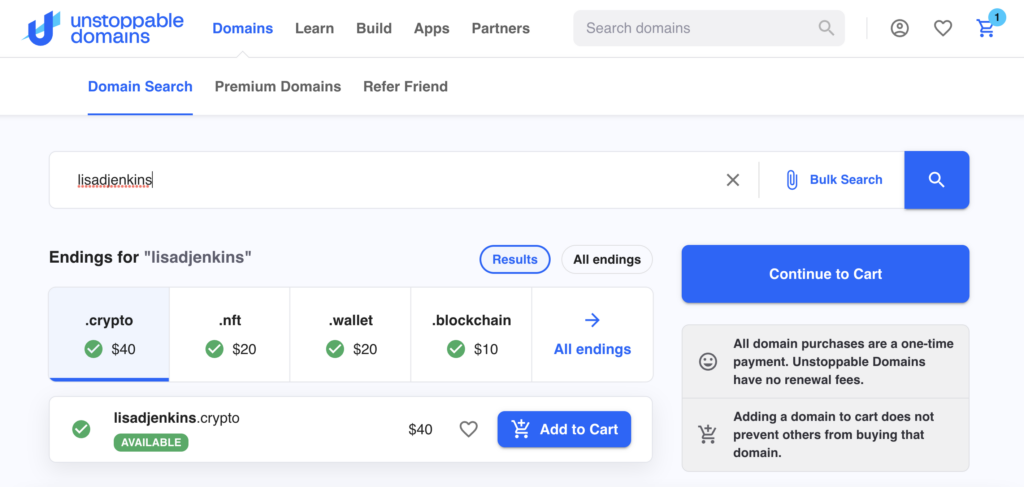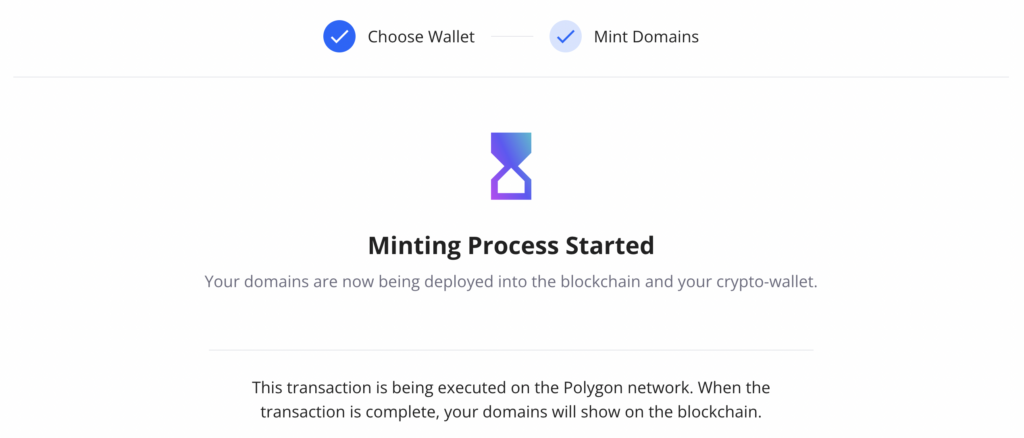Wondering how people will interact in a decentralized, transparent world? Do you imagine a future where your business will take advantage of the blockchain?
In this article, you’ll discover why digital identity matters for Web3 and you'll learn how businesses are putting it to use.

This article was co-created by Sandy Carter and Michael Stelzner. For more about Sandy, scroll to Other Notes From This Episode at the end of this article.
How Web3 and Digital Identity Are Changing Business
Businesses of all sizes need to understand that Web3 is the next generation of the internet.
One of the exciting things about Web3 is that it will leverage blockchain, decentralization, and digital identity to improve the relationship between business and customer.
To understand how the relationship will improve, you need to understand how all four relevant pieces of the tech stack fit together. Think of it as a layer cake.
Layer 1: Blockchain
The foundational layer or backbone of the metaverse is blockchain technology. Blockchain is a trusted, secure, immutable, and programmable technology that’s used by many Web2 companies today.
Starbucks and Google, to name two.
To clarify, blockchain is not cryptocurrency; cryptocurrency is a use case of blockchain technology.
Layer 2: Web3
Sitting on top of blockchain technology is Web3. Web3 allows decentralization and shifts ownership of your personal data from third-party entities to you, the individual.
Layer 3: Decentralized Autonomous Organizations (DAOs)
A staple of Web3 and powered by blockchain, DAOs provide a new way for stakeholders to gather around and govern a project, business, or organization. A DAO allows each member of the community to exercise their individual voice and vote on initiatives.
Get World-Class Marketing Training — All Year Long!
Are you facing doubt, uncertainty, or overwhelm? The Social Media Marketing Society can help.
Each month, you’ll receive training from trusted marketing experts, covering everything from AI to organic social marketing. When you join, you’ll also get immediate access to:
- A library of 100+ marketing trainings
- A community of like-minded marketers
- Monthly online community meetups
- Relevant news and trends updates
Layer 4: Metaverse
The metaverse sits on top of all three layers and brings in artificial intelligence, augmented reality, and virtual reality to create a 3D internet.
The Full Tech Stack Puts Consumers in Charge
On one side of this cake or tech stack are the businesses and creators (artists, musicians, etc.) that produce goods. On the other side is the digital consumer network made up of everyone who consumes goods.
In traditional Web2 marketplaces, at least one third party such as Google or Meta is typically involved in one way or another. In fact, Google and Facebook make a hundred billion dollars annually by selling individual users’ data to retailers and other businesses that want to reach them via Facebook or Google ads. The retailers that purchase the data then have to factor in a percentage for fraudulent data.
In Web3 marketplaces, the need for businesses to buy third-party user data will be eliminated because individuals can decide for themselves which businesses can access their data. The blockchain will ensure that the data is accurate.
Marketers, in turn, will shift from using targeted data to reach consumer audiences to figuring out how to entice individual consumers to share their personal data with that business.
This brings us to digital identities.
What Is Digital Identity?
In Web2, a person’s identity varies. One identity is used to sign into Google, another is used to sign into Facebook, and so on. Even if each of these identities uses the same email address, they all require separate accounts using separate login credentials.
You as a user give each network access to your data in exchange for the convenience of using its platform. That platform then sells your data and owns your audience, in a sense.
Web3 flips that scenario on its head by allowing you to use a single identity that’s tied to your digital wallet.

Rather than setting up a separate account on every platform, Web3 allows people to connect their unique wallet to an application or platform. And with that connection, a person can decide exactly what data to share. No more subjecting yourself to hundreds of emails clogging your inbox simply because you made a purchase. You can decide whether to give a business access to your email address when you connect your wallet to their platform.
Use Cases for Digital Identity
Social Networks and Influence
A key pain point of Web2 is that as you move from application to application, your identity doesn’t follow you.
For example, in Web2, a person can sign into Twitter with several thousand followers and they hold influence on the platform thanks to those followers. Because the identity of that person stays with the application, when they create an account over on Discord or some other platform, they essentially create an entirely new identity with zero following on that application. The influence they hold as a brand stays with each individual network.
In Web3, this all changes because the influence you have on one platform goes with you when you sign up for another platform.
eCommerce and Privacy
Have you ever seen a t-shirt you wanted to buy from an online store but you held off because you didn’t want the multitudes of marketing emails you’d get for a year following your purchase?
In Web3, that store will have a permissions checklist and you can decide which of your personal details to share with that store.
Healthcare Decisions and Records
Today, about 60% of misdiagnoses happen because the doctor didn’t have access to the data they needed.

Discover Proven Marketing Strategies and Tips
Want to go even deeper with your marketing? Check out the Social Media Marketing Podcast! Publishing weekly since 2012, the Social Media Marketing Podcast helps you navigate the constantly changing marketing jungle, with expert interviews from marketing pros.
But don’t let the name fool you. This show is about a lot more than just social media marketing. With over 600 episodes and millions of downloads each year, this show has been a trusted source for marketers for well over a decade.
Web3 will also make the sharing of medical data during special circumstances such as moving to a new state, an emergency when the patient can’t discuss their medical history, or when a patient doesn’t know they need to divulge certain details because they misunderstand the relevance. Also, it won’t be necessary to request records to be sent to another healthcare facility, just to have those records get lost in transit. By having control over their own data, people can reduce the chances of that data being lost or incorrect due to human error.
Education
Your digital identity can go beyond just who you are and what you’re buying. Some universities are already testing the concept of including their diplomas, degrees, and certifications as NFTs, which would attach them to your digital identity. No more having to contact university personnel to find and send a copy of your transcripts whenever another organization asks for them. You can simply connect your wallet and grant that organization access to your university credentials.
Because these tokens sit on the blockchain, users and businesses alike can feel safe about their accuracy and security as validated, trusted data.
Digital tokens can also be used to validate a person’s attendance at a particular event. This opens up the possibility for businesses to offer new perks to people who attended events without the time-consuming task of going through records to verify attendance.
#3: How to Set Up a Digital Identity for Yourself or a Business
The first step in acquiring a digital identity is to choose and set up a crypto wallet such as MetaMask or Coinboise.
Then you need to secure that identity through a service like Unstoppable Domains.
Search for your preferred identity, then choose and purchase a domain to serve as your username/digital identity across Web3 applications.

Once you’ve purchased the domain you want to use as your digital identity, you mint that domain by connecting your wallet and documenting your ownership of that identity to the blockchain.

After the mint, it’s time to explore the possibilities of how you want to use this digital identity for your business.

You can give out NFTs for events or conferences you’re hosting, set up a seminar and give a small presentation in the Metaverse, etc.
Sandy Carter is a futurist and Senior Vice President at Unstoppable Domains. She’s the author of Extreme Innovation. Find Sandy on
Other Notes From This Episode
- Coinbase https://www.coinbase.com/wallet
- Decentraland https://decentraland.org/
- MetaMask https://metamask.io/
- Connect with Michael Stelzner @Stelzner on Instagram and @Mike_Stelzner on Twitter.
- Watch the interview and other exclusive content on the Crypto Business YouTube channel.
Listen to the Podcast Now
This article is sourced from the Crypto Business podcast. Listen or subscribe below.
Where to subscribe: Apple Podcast | Google Podcasts | Spotify | Amazon Music | RSS
✋🏽 If you enjoyed this episode of the Crypto Business podcast, please head over to Apple Podcasts, leave a rating, write a review, and subscribe.
Disclaimer: The information provided on this website is provided solely for educational purposes and does not constitute any advice, including but not limited to, investment advice, trading advice or financial advice, and you should not treat any of the website's content as such. Social Media Examiner recommends that you independently research any information contained on this Website and that you speak with an investment professional before making any decision to purchase, trade, hold or sell cryptocurrency. Nothing herein should be treated as a recommendation to buy, sell or hold cryptocurrency. Social Media Examiner cannot guarantee the accuracy of any information listed on the website and is not responsible for any missing or wrong information. All information is provided as is and should be used at your own risk. Social Media Examiner disclaims all responsibility and liability for your use of any information found on the website.
Attention Agency Owners, Brand Marketers, and Consultants

Introducing the Marketing Agency Show–our newest podcast designed to explore the struggles of agency marketers.
Join show host and agency owner, Brooke Sellas, as she interviews agency marketers and digs deep into their biggest challenges. Explore topics like navigating rough economic times, leveraging AI, service diversification, client acquisition, and much more.
Just pull up your favorite podcast app, search for Marketing Agency Show and start listening. Or click the button below for more information.

